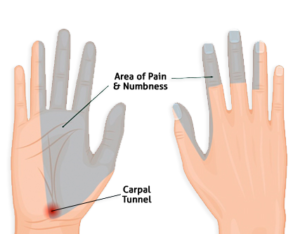What is Carpal Tunnel Syndrome?

Carpal tunnel syndrome is also called median nerve compression. It is a condition that causes tingling, numbness, or weakness in your hands. This condition occurs due to pressure on the median nerve. And this nerve runs the length of your arm, through a tunnel in your wrist, called the carpal tunnel. The carpal tunnel then ends in your hand. Furthermore, the median nerve controls the movement in most of your fingers. Pinky the exception.
Symptoms of Carpal Tunnel
When carpal tunnel occurs, you may notice at night that your fingers go to numb. And this typically happens because of how you place your hand while you sleep. Then, in the morning when you awake, numbness and tingling in your hands are common. Sometimes, these symptoms may even run up your shoulder.
Additional Symptoms of Carpal Tunnel Include:
- Burning, tingling, or itching numbness in your palm and thumb or your index and middle fingers
- Weakness in your hand and trouble holding things
- Shock-like feelings that move into your fingers
- Tingling that moves up into your arm
Causes of Carpal Tunnel Syndrome
When carpal tunnel occurs it’s most often to due to the following:
- Repetitive motions, such as typing, or any wrist movements that you do over and over. This is especially true of things you do when your hands are lower than your wrists.
- Pregnancy
Sometimes, certain conditions are to blame, such as:
- Hypothyroidism
- Obesity
- Rheumatoid Arthritis (RA)
- Diabetes
You may be a higher risk if you:
- Are female. Women are 3x more likely than men to get it. Because they tend to have smaller carpal tunnels.
- Have a family member with small carpal tunnels
- Have a job in which you make the same motions with your arm, hand, or wrists over and over, such as an assembly line worker, sewer or knitter, baker, cashier, hairstylist, or musician
- Fracture or dislocate your wrist
Carpal Tunnel Treatment
Treatment varies from person to person. One factor is how long you’ve been experiencing the condition. However, common recommendations from doctors are as follows:
Changing your lifestyle. Repetitive motions are common in certain activities. Therefore, doing this activity less often may help relieve pain.
Wrist Exercises & Stretches. Strengthening and stretching will help the nerve move better within the carpal tunnel.
Get a splint. Immobilizing the wrist is a good idea to keep your wrist from moving. Sometimes, this will get rid of the tingling and numbness.
Anti-inflammatory drugs. Over the counter medications may help. However, if they don’t, a steroid injection may be your next move.
Surgery:
Lastly, if conservative methods do not work for you carpal tunnel release surgery is a good option. This quick procedure increases the size of the tunnel and eases pressure on the nerve causing pain.
If you are experiencing a carpal tunnel call us now at 888-409-8006. Schedule an appointment with a hand/wrist specialist now.
